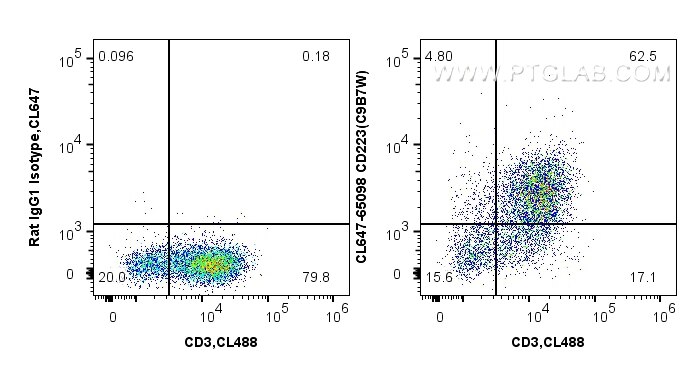Anticorps Monoclonal anti-CD223
CD223 Monoclonal Antibody for FC
Hôte / Isotype
Rat / IgG1, kappa
Réactivité testée
souris
Applications
FC
Conjugaison
CoraLite® Plus 647 Fluorescent Dye
CloneNo.
C9B7W
N° de cat : CL647-65098
Synonymes
Galerie de données de validation
Applications testées
| Résultats positifs en cytométrie | Con-A stimulated BALB/c mouse splenocytes, |
Dilution recommandée
| Application | Dilution |
|---|---|
| This reagent has been tested for flow cytometric analysis. It is recommended that this reagent should be titrated in each testing system to obtain optimal results. | |
| Sample-dependent, check data in validation data gallery | |
Informations sur le produit
CL647-65098 cible CD223 dans les applications de FC et montre une réactivité avec des échantillons souris
| Réactivité | souris |
| Hôte / Isotype | Rat / IgG1, kappa |
| Clonalité | Monoclonal |
| Type | Anticorps |
| Immunogène | Protéine de fusion CD223-Ig murine |
| Nom complet | lymphocyte-activation gene 3 |
| Numéro d’acquisition GenBank | BC120591 |
| Symbole du gène | Lag3 |
| Identification du gène (NCBI) | 16768 |
| Conjugaison | CoraLite® Plus 647 Fluorescent Dye |
| Excitation/Emission maxima wavelengths | 654 nm / 674 nm |
| Forme | Liquide |
| Méthode de purification | Purification par affinité |
| Tampon de stockage | PBS with 0.09% sodium azide. |
| Conditions de stockage | Store at 2-8°C. Avoid exposure to light. Stable for one year after shipment. |
Informations générales
Lymphocyte activation gene 3 protein (LAG-3), also known as CD223, is a type I transmembrane protein belonging to the immunoglobulin superfamily (PMID: 1692078). It is a CD4-related molecule that binds MHC class II with high affinity (PMID: 1692078; 9159144). LAG-3 is expressed on activated T and NK cells. Besides, natural CD4(+)CD25(+) Tregs express LAG-3 upon activation (PMID: 15485628). LAG-3 negatively regulates T-cell function and homeostasis, and contributes to the suppressor activity of Tregs (PMID: 14644131; 15485628).
Protocole
| Product Specific Protocols | |
|---|---|
| FC protocol for CL Plus 647 CD223 antibody CL647-65098 | Download protocol |
| Standard Protocols | |
|---|---|
| Click here to view our Standard Protocols |


